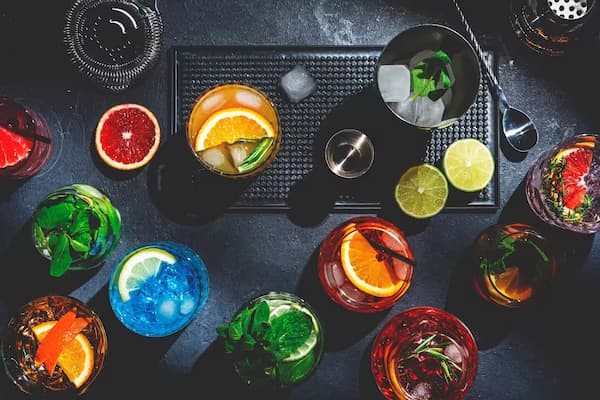Ginger Ale
About Ginger Ale
In the world of mixology, ginger ale is appreciated for its ability to add both effervescence and a refreshing ginger flavor without overpowering other ingredients. It pairs well with a wide array of spirits such as whiskey, rum, and vodka, enhancing the overall flavor profile of the drink. Popular cocktails that feature ginger ale include the Whiskey Ginger, Moscow Mule (traditionally made with ginger beer but often substituted with ginger ale for a less intense ginger flavor), and the Pimm's Cup. The drink's popularity in cocktail making is largely due to its perfect balance of sweetness and spice, adding depth and complexity to cocktails while complementing the alcohol's warmth.
Q&A
What is the history behind ginger ale as a cocktail ingredient?
Ginger ale's origins date back to the 19th century, where it was first created as a medicinal tonic to aid digestion and alleviate nausea. Its use in the cocktail world began to rise with its popularization as a refreshing and versatile mixer. Golden ginger ale was the original style, characterized by a strong ginger flavor and a deep golden color due to the ginger and caramel sugar used in its production. Dry ginger ale was developed during the Prohibition era, offering a milder taste and lighter color, which made it an instant favorite in speakeasies for mixing with illicit spirits. Over time, ginger ale has become a staple in mixology for its unique flavor profile and effervescence.
Can I substitute ginger beer for ginger ale in cocktails?
Yes, ginger beer can be substituted for ginger ale in cocktails, but it's important to note that ginger beer is generally spicier and less sweet than ginger ale. This can change the flavor profile of your cocktail, making it more robust with a stronger ginger presence. If you're substituting ginger beer for ginger ale, consider adjusting the other ingredients accordingly to balance the flavors.
What garnishes work well with ginger ale-based cocktails?
Ginger ale-based cocktails pair well with fresh, aromatic garnishes that complement the drink's spicy-sweet flavor profile. Some popular options include lime or lemon wedges, which add a zesty brightness; mint sprigs, which offer a refreshing contrast to the ginger's heat; and thin slices of fresh ginger or candied ginger, which reinforce the ginger theme. Depending on the cocktail, you might also explore using seasonal fruits or a dusting of ground spices like cinnamon or nutmeg to garnish.
How should ginger ale be served in cocktails to maximize its flavor?
To maximize the flavor of ginger ale in cocktails, it should be served chilled or over ice. Adding ginger ale to a cocktail just before serving helps preserve its sparkling effervescence, enhancing the drink's texture and overall experience. For mixed drinks, consider the balance of flavors; ginger ale's sweetness and spice can be adjusted with the other components to create a harmonious blend. When using ginger ale as a primary mixer, consider the type (golden vs. dry) to best complement the spirit and other ingredients.
Are there any dietary considerations to keep in mind when using ginger ale in cocktails?
When incorporating ginger ale into cocktails, be mindful of its sugar content, which can add significant calories to a drink. For those monitoring their sugar intake, low-sugar or sugar-free versions of ginger ale are available and can be used as substitutes without sacrificing flavor. Additionally, ginger ale is gluten-free, making it suitable for those with gluten sensitivities or celiac disease. However, always check the label, as some brands might add ingredients or use processing methods that introduce allergens.
Ingredients like Ginger Ale
Other Soft Drinks
How it works
Easily create your bar from the ingredients you have at home, and we'll show you what you can make with the ingredients you have to hand.
Once you've added this ingredient head to your My bar page and fill up everything else you have.
We'll also show you cocktails that can make by substituting what you have for one of the ingredients you don't, riffing on the original. Now go forth and create something delicious!



-preview-large.jpg)













